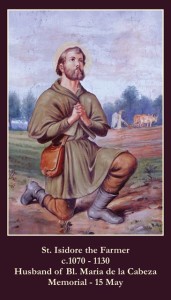
Saint Isidore the Farmer (1070-1130)
Image: Pinterest
Born in Spain Madrid to poor parents, Isidore was named after Saint Isidore of Seville (Feast Day: 04 April) and while his parents could not afford to provide their son with a formal education, they instilled in him a love of prayer and an hatred of sin at an early age.
When Isidore was barely old enough to wield a hoe, he took employment for Juan de Vergas, according to Franciscan Media a wealthy landowner from Madrid, working faithfully on his estate outside the city for his entire life.
As the years past and Isidore reached the age of marriage in his day, he met a young woman Maria de la Cabeza (Feast Day: 09 September) who shared his Christian values and later they were married–subsequently they had one son who died as a child. Following his death, they agreed to serve God together and had no other children.
Isidore became a model of how to unite prayer and work in the Christian life. Every morning he would arise early to celebrate Mass and all day long as he toiled in the fields, he would be praying to God, the Saints and/or to his Guardian Angel. Isidore would spend many holidays making pilgrimages to visit Churches of Madrid and surrounding areas.
One day, Isidore’s envious co-workers complained to Juan de Vergas that Isidore had been arriving late for work for he lingered in Church too long following Mass. When de Vergas went to investigate, he saw Angels plowing the field in Isidore’s place; Another time, de Vergas saw two Angels working alongside of Isidore, so that he would accomplish 3 times as much as his fellow co-workers.
Isidore became well known for his love and generosity for the poor, miraculously supplying them with food, together with his kindness to animals–Isidore reportedly worked many miracles throughout his life and was already considered to be a Saint among men before his death on this date in 1130
On the 12 March, 1622 Isidore was Canonized by Pope Gregory XV
It is said that in the year 1212 that Saint Isidore appeared to King Alfonso VIII (1155-1214) who at the time was engaged in war with the Moors (Islamic Jihadists at Las Navas de Tolosa) to show him a way to surprise the enemy.
King Alfonso was successful in his military campaign against the Moors and Almohads (Islamic Caliphate) in a decisive Christian victory that helped turn the tide of the ‘Reconquista’ recapturing territory seized by Muslims, according to Encyclopedia Britannica that had occupied most of the Iberian Peninsula.
More here from EWTN
Publishers Note: Pope Pius V (Feast Day 30 April) is remembered as a defender of Catholic doctrine and Christian civilization for implementing steps in his time to stop the spread of militant Islam, bringing together both Spanish and Italian naval forces–realizing a dramatic and decisive battle against the Muslim’s, destroying their entire naval fleet in 1571
Tweet